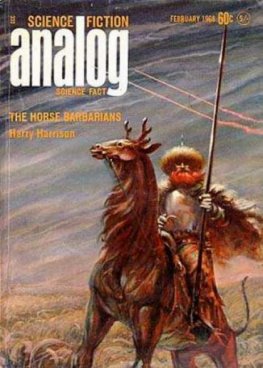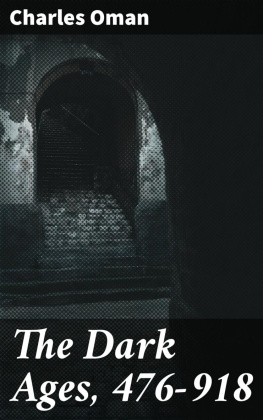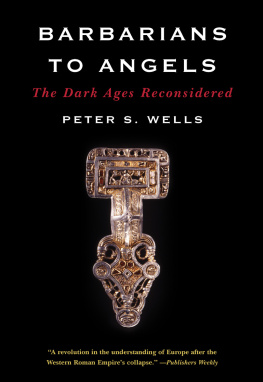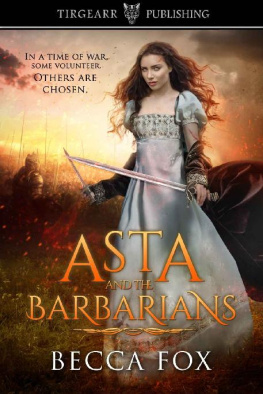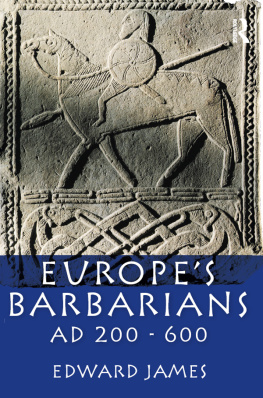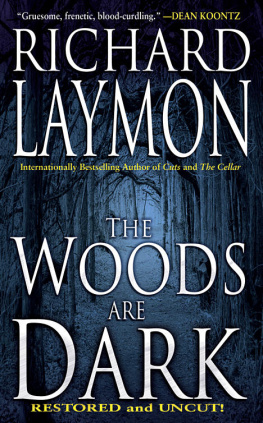Richard Rudgley - Barbarians: Secrets of the Dark Ages
Here you can read online Richard Rudgley - Barbarians: Secrets of the Dark Ages full text of the book (entire story) in english for free. Download pdf and epub, get meaning, cover and reviews about this ebook. year: 2014, publisher: Thistle Publishing, genre: Religion. Description of the work, (preface) as well as reviews are available. Best literature library LitArk.com created for fans of good reading and offers a wide selection of genres:
Romance novel
Science fiction
Adventure
Detective
Science
History
Home and family
Prose
Art
Politics
Computer
Non-fiction
Religion
Business
Children
Humor
Choose a favorite category and find really read worthwhile books. Enjoy immersion in the world of imagination, feel the emotions of the characters or learn something new for yourself, make an fascinating discovery.

- Book:Barbarians: Secrets of the Dark Ages
- Author:
- Publisher:Thistle Publishing
- Genre:
- Year:2014
- Rating:3 / 5
- Favourites:Add to favourites
- Your mark:
- 60
- 1
- 2
- 3
- 4
- 5
Barbarians: Secrets of the Dark Ages: summary, description and annotation
We offer to read an annotation, description, summary or preface (depends on what the author of the book "Barbarians: Secrets of the Dark Ages" wrote himself). If you haven't found the necessary information about the book — write in the comments, we will try to find it.
Barbarians: Secrets of the Dark Ages — read online for free the complete book (whole text) full work
Below is the text of the book, divided by pages. System saving the place of the last page read, allows you to conveniently read the book "Barbarians: Secrets of the Dark Ages" online for free, without having to search again every time where you left off. Put a bookmark, and you can go to the page where you finished reading at any time.
Font size:
Interval:
Bookmark:
Barbarians
Secrets of the Dark
Ages
Richard Rudgley
Copyright 2002, Richard Rudgley
RICHARD FREDERICK RUDGLEY
When we compare the present life of man on earth with that time of which we have no knowledge, it seems to me like the swift flight of a single sparrow through the banqueting-hall where you are sitting at dinner on a winter's day with your thegns and counsellors. In the midst there is a comforting fire to warm the hall; outside, the storms of winter rain or snow are raging. This sparrow flies swiftly in through one door of the hall, and out through another. While he is inside, he is safe from the winter storms; but after a few moments of comfort, he vanishes from sight into the wintry world from which he came. Even so, man appears on earth for a little while; but of what went before this life or of what follows, we know nothing.
Bede
A son is better though late begotten of an old and ailing father.
Only your kin
will proudly carve a memorial at the main gate.
Hvaml
(The Sayings of the High One)
Acknowledgements
I would like to thank all the people whom I met on my journey through Britain and elsewhere in Europe in search of more tangible links with the past than books alone could provide, particularly: Lindsay Allason-Jones on Hadrian's Wall; members of Angelcynn, especially Colin and Ben Levick; Richard Bailey on Lindisfarne; Alan Baxter, manager of West Stow Anglo-Saxon Village; Dan Carlsson for a fascinating tour of Gotland; Joanna Caruth of the Suffolk Archaeological Unit at Lakenheath; Martin Carver, excavator of Sutton Hoo; the swordsmith Hector Cole; Richard Darrah on Anglo-Saxon woodworking skills; Angela Evans, curator at the British Museum; Manuela Farneti at the beautiful church of Sant' Apollinare Nuovo, Ravenna; Michael Gebhr on the Nydam boat in Schleswig; Sauro Gelichi at the mausoleum of Theoderic; Edwin and Joyce Gifford for having me on board the S Wylfing; Catherine Hills on the Anglo-Saxons; Olaf Hckmann in Mainz; horse archer Kassai Lajos in Kaposmero, Hungary; Lola Luque for help in Cordoba; Sergeant McHale for escorting me round RAF Lakenheath; Soren Nielsen at Roskilde Viking Ship Museum, Denmark; Knut Paasche, curator of the Viking Ship Museum, Oslo; Ricardo Perezsbrino, surgeon in Cordoba; Dominic Powlesland at West Heslerton; Julio Samso on Islamic science in Spain; Jorn Schuster, curator at the Burg Bederkesa Museum; Laura Sole at Bede's World, Jarrow; Jonas Strm for showing me the Krampmacken in Gotland; Janos Tari, for interpreting for Peter Tomka in Hungary, and Tomka himself; Maria Teschler-Nicola and Karin Wiltschke-Schrotta of the Naturhistorisches Museum, Vienna; Brunetta Zavatti (see photo), for her mosaic making; Karoline Zhuber-Okrog and Elisabeth Reicher of the Kunsthistorisches Museum, Vienna.
I would also like to thank all those people who worked with me on the Granada Media television series Secrets of the Dark Ages made for Channel 4: Mark Atkinson, Mark Elliot, Alex Horsfall, Birgitte Johnson, Bill Jones, Faith Lawrence, Paul Lord, Roger Lucas, Chris Malone, Liz McLeod, Alison Neslany, Tim Pollard, Karen Stockton, Graham Veevers and David Wason. At Channel 4 Books: Charlie Carman and my long-suffering editor Gillian Christie the support and understanding of both has been greatly appreciated; Christine King, my text editor; and my agent, Andrew Lownie.
Thanks to Benedict for help with references concerning Gotland; to my mother-in-law Dorothy for her invaluable support during the last stages of the writing of this book; to Bernadete for her much appreciated help; and to my dear wife Robin for her fortitude in difficult circumstances.
The dedication is to the memory of my father, who died during the writing of this book.
Introduction
The very word 'barbarian' conjures up images of violence, savagery and contempt for learning and the world of books so to try to put across the barbarian viewpoint in a book is rather ironic. Yet the word also evokes heroism and drama, however tainted by blood and destruction. So what were the barbarians really like? Were they truly as bad as their reputation suggests, or did they have genuine cultures and subtle beliefs of their own? Was their era simply a black mark in the history of humanity, or did they actually contribute a legacy of lasting significance? In fact, just who were the barbarians? Where did they come from? What was the driving force behind their restless migrations, their conflicts with each other and with Rome? Who were their warriors, their diplomats and their leaders?
These are among the questions that are raised in this book. History should never be written in black and white, but always in shades of grey. We must guard against the temptation to portray the 'civilised' Romans as pure as driven snow and the barbarians as the harbingers of darkness and ignorance. There are two sides to every story, yet the barbarian version of events is barely known. This book is an attempt to turn the tables and catch a glimpse of what those times might have meant to the barbarians themselves.
The era of history that Barbarians deals with is sometimes called by the neutral name of the Early Medieval Period (the Early Middle Ages), from AD 300 to 1000 beginning with the decline and fall of the western Roman empire and ending with the coming of a new millennium. In England, part of this period (or sometimes even the whole period) has often been called the Dark Ages, an era little known and little understood, whose very name embodies this obscurity.
The term 'Dark Ages' is a loaded one that can be read in two ways. Firstly, it is seen as dark in the sense that there are few written records to illuminate the period, compared with those before and after it and writing is understood to be a marker of civilisation. Secondly, the Dark Ages have been portrayed by conventional history as a time of moral, cultural and social decay, precipitated by the collapse of Rome and, therefore, civilisation itself. We are led to believe that the torch of civilisation flickered only in the monasteries that dotted the landscape of a Europe engulfed in the darkness of barbarism. While this period of our history may well have been dark in the first sense, it is wrong to accept the second interpretation without greatly qualifying it. The period should not simply be stereotyped as one of cultural backsliding and ignorance, a yawning chasm between the fall of Rome and the domination of Europe by Christianity.
Many historians prefer not to talk about the Dark Ages at all, and use different terms to describe this period. In Germany it is known as the Age of Migration, or time of Volkerwanderung (wandering peoples), in recognition of the fact that this was a period of great upheaval and change in the make-up of the ethnic map of the continent.
The Barbarian Peoples
In this mysterious and complex period of our past, there were a great many barbarian tribes competing for power and land on the European stage. Some of them were destined to disappear or dissolve into the ethnic mix that characterised the continent at the time. The names of others, such as the Franks, the Angles, the Lombards and the Saxons, survive to this day on the maps of Europe: in France, England, Lombardy and Saxony. Most of the names of these past peoples (or ethnonyms as they are sometimes called) appear only here and there in the ancient records: the Alamanni, the Alans, the Avars, the Gutones, the Tervingi, the Heruli, the Antes, the Rugians, the Suevi, the Scirians and the Gepids were among those who were either swallowed up by other ethnic groups or simply played too minor a role in the great political machinations of the time to merit further attention from the chroniclers.
Next pageFont size:
Interval:
Bookmark:
Similar books «Barbarians: Secrets of the Dark Ages»
Look at similar books to Barbarians: Secrets of the Dark Ages. We have selected literature similar in name and meaning in the hope of providing readers with more options to find new, interesting, not yet read works.
Discussion, reviews of the book Barbarians: Secrets of the Dark Ages and just readers' own opinions. Leave your comments, write what you think about the work, its meaning or the main characters. Specify what exactly you liked and what you didn't like, and why you think so.

